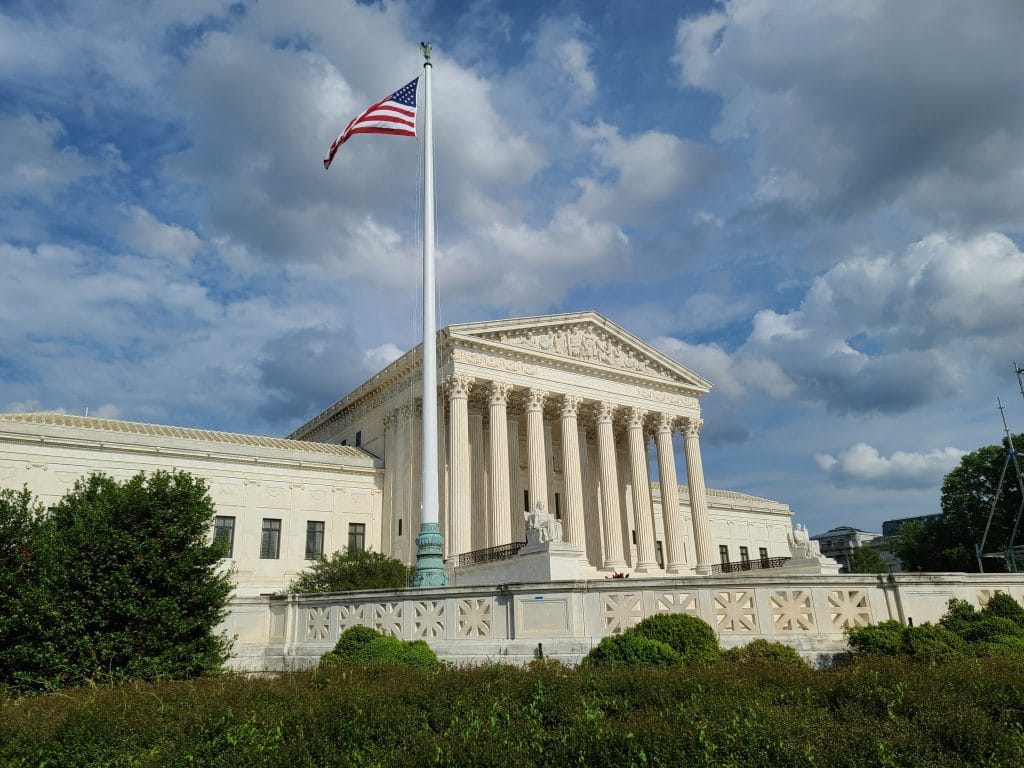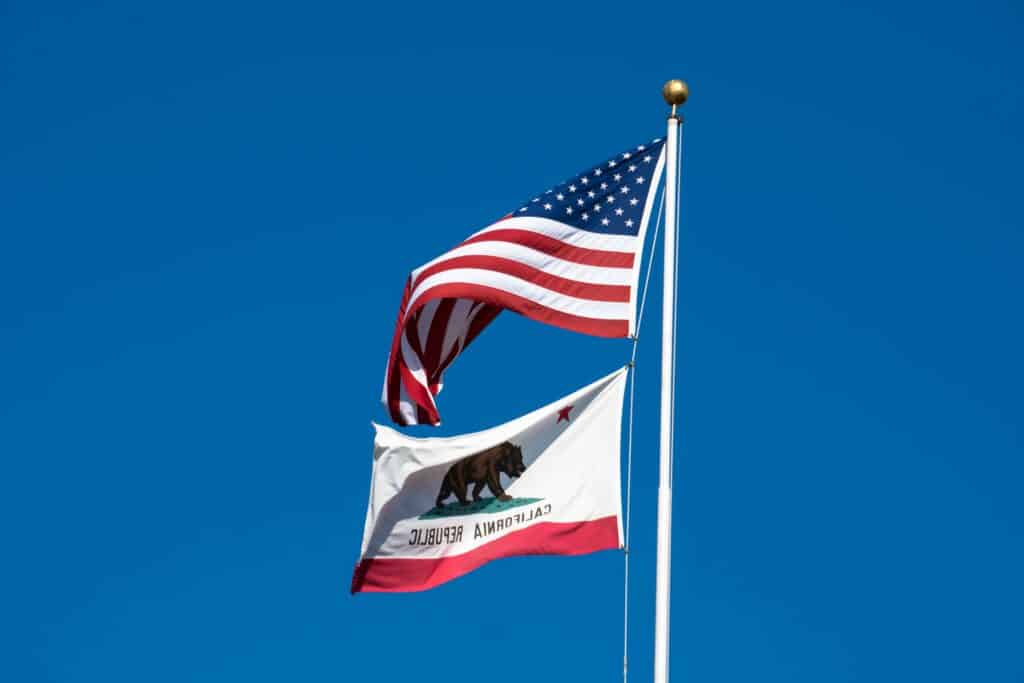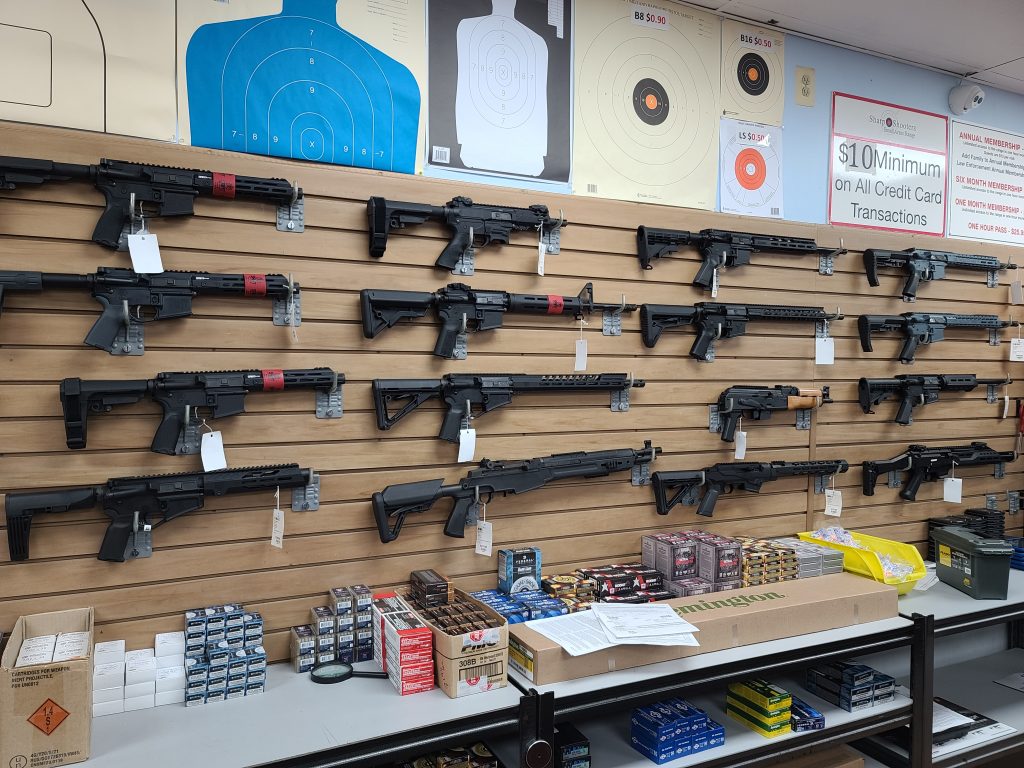We found out this week that 64 percent of Americans approve of the Supreme Court’s latest decision recognizing expanded Second Amendment protections. And approval for the ruling has only increased since it was handed down in June.
This may come as a surprise for some, but Contributing Writer Jake Fogleman explains why it shouldn’t be. He explores how a legal and cultural shift preceded the Supreme Court’s action in Bruen, just as it did before the Court’s previous landmark Second Amendment ruling in Heller.
He also gives us an update on the latest development in a California gun suit that puts the state’s unique fee-shifting law for Second Amendment challenges squarely in the sights of a federal judge. And I explain why an Everytown-backed Uvalde lawsuit against gun companies and law enforcement has little hope of succeeding on either front.
Plus, Georgia State University professor Timothy Lytton joins the podcast to talk about how guns will impact the Senate runoff.

Analysis: The Popularity of the Bruen Decision Should Not Come as a Surprise [Member Exclusive]
By Jake Fogleman
You wouldn’t know it from the reaction of political leaders in states affected by the decision, but the Supreme Court’s holding in New York State Rifle and Pistol Association v. Bruen is very popular among the American public. That’s because a decades-long cultural shift towards concealed carry had already succeeded well before the justices ever took up the case.
A Marquette University law school poll released this week found 64 percent of Americans have a favorable opinion of the Supreme Court’s holding that the “Second Amendment protects the right to possess a gun outside the home.” By contrast, 35 percent say they oppose the decision, with only 16 percent saying they’re strongly opposed.
That such a substantial majority gave a warm reception to the concept of public concealed carry rights should not come as a shock. For nearly all of the country, the Court did little more than affirm the status quo.
When the decision was handed down, three-quarters of the population lived in a state where law-abiding adults faced only limited barriers to carrying a concealed firearm for self-defense. They could do so in 25 of those states without even needing to obtain a government-issued permit.
A tandem of shifting cultural practices and state legislation made that possible. Beginning in 1987 with Florida’s adoption of “shall-issue” concealed carry permitting, where state officials can’t subjectively deny permit applications, a revolution in liberalized gun carry laws began to sweep the country.
At the same time, the cultural practices surrounding gun ownership began to shift. Older gun owners primarily concerned with using long guns for hunting and other sporting pursuits gave way to a new generation interested in handguns and mainly motivated by personal protection. Scores of publicly available data show that as the culture shifted, gun owners began to take advantage of the permissive changes to state carry laws.
A new peer-reviewed study released last month in the American Journal of Public Health found that the number of Americans who report carrying a firearm every day doubled from the mid-to-late 2010s.
“In 2019, about 16 million or roughly 3 in 10 (30.3 %) of U.S. handgun owners carried handguns in the past month (up from 9 million or 23.5% in 2015), and approximately 6 million did so daily (twice the 3 million who did so in 2015),” the study’s authors wrote.
Similarly, Georgetown University Professor William English’s 2021 National Firearms Survey found that 56.2 percent of gun owners, around 45.8 million adults, say there are certain circumstances in which they carry a handgun for self-defense. The survey found that approximately 20.7 million individuals report carrying a gun in public with some level of regularity.
These data points are just a few examples of how ubiquitous public gun carry had become for vast swaths of the country before the Supreme Court ever agreed to hear a case on the matter. Just eight states, representing about a quarter of the country’s population, made carrying firearms for self-defense a foreign concept reserved for the wealthy and politically connected by allowing officials to deny permit applications subjectively using “may-issue” laws.
Shortly after the Supreme Court struck down those subjective “may-issue” standards in June, Marquette found that only 56 percent agreed with the ruling. The eight-point boost in favorability between now and then could be the result of people in those states recognizing that living under a shall-issue carry regime is not an apocalyptic scenario but, rather, business as usual as it had been in most of the country that had made the shift years earlier. In time, as states that had “may-issue” standards are forced to comply with the Court’s summer ruling, and average residents of those states begin receiving permits for the first time, the ruling’s popularity may increase further.
The evolution of public opinion over the Supreme Court’s handling of carry rights mirrors the public’s response to Heller. A Gallup poll conducted just after that landmark decision also found that it was overwhelmingly popular with the American people.
“The Supreme Court’s ruling on Thursday that a District of Columbia ban on handgun ownership is unconstitutional appears to be solidly in step with public opinion,” Gallup wrote at the time. “A clear majority of the U.S. public — 73% — believes the Second Amendment to the Constitution guarantees the rights of Americans to own guns.”
By contrast, only 20 percent of respondents to that poll agreed with the so-called collective rights interpretation of the Second Amendment the Court explicitly rejected in Heller. It also found that “almost 7 out of 10 Americans are opposed to a law that would make the possession of a handgun illegal, except by the police.”
In the aftermath of that ruling, handgun bans have only grown less popular among the American public. Handguns have now become the country’s most commonly owned type of firearm, owned by nearly three out of every four gun owners.
In both instances, the Supreme Court’s decision was a lagging indicator of a broader cultural shift that had already taken place and been ratified in the court of public opinion. The American people, through their state representatives and their decisions to make handgun ownership and concealed carry widespread, already demonstrated their agreement with the Supreme Court’s Bruen decision. The new polling data is just further confirmation of that fact.
Podcast: George State University’s Timothy Lytton on How Guns Will Impact the Senate Runoff [Member Early Access]
By Stephen Gutowski
The race that will decide the final balance of power in the Senate will be decided in a matter of days.
The contest in Georgia between incumbent Democrat Raphael Warnock and Republican challenger Hershel Walker won’t determine who controls the Senate since Democrats have already accomplished that, but it will determine how easily they can move forward with President Joe Biden’s executive and judicial appointments. That will significantly impact gun policy for the next two years. So, we’ve got Georgia State University professor Timothy Lytton on the show to talk about where the race is headed.
Professor Lytton gives expert on-the-ground insight into how gun politics are affecting the race. He argues that gun policy is continually a major issue in the increasingly-purple state. And he says that while guns are unlikely to be a top issue in the campaign, they may be a decisive one for turning out votes.
That’s why it makes sense that the NRA is dumping millions of dollars into the race. It’s also why the relative absence of the major gun-control groups is so surprising. But Lytton says they may still be contributing in other ways that aren’t captured by Federal Elections Committee filings.
We also go over Governor Brian Kemp’s (R.) win over Democrat Stacey Abrams. Lytton said gun policy featured even more heavily in that race due to Kemp’s successful push for permitless gun-carry earlier this year. But he’s not so sure another big push to loosen the state’s gun laws will be coming in the wake of Kemp’s win.
Plus, Contributing Writer Jake Fogleman and I discuss new polling that shows the Supreme Court’s latest Second Amendment decision is popular.
You can listen to the show on your favorite podcasting app or by clicking here. Video and clips of the episode are available on our YouTube channel. As always, Reload Members get access to the show on Sunday, and everyone else gets it on Monday.
Come on the Podcast
One of the many perks of a Reload membership is the opportunity to appear on the podcast. We’ve had a lot of people on the show from all kinds of backgrounds. It’s one of my favorite segments since it gives us all a better insight into the community that makes this publication possible. If you want to come on the show, just reply to this email and let me know!

Federal Judge Rules Against California’s Attempt to Block Judicial Review of ‘Chilling’ Gun Litigation Law
By Jake Fogleman
An attempt by the California Attorney General to shield the state’s novel fee-shifting law for gun suits from judicial review has been rebuked in court.
U.S. District Judge Roger Benitez ruled on Thursday that two challenges from gun rights groups to a novel California law designed to discourage Second Amendment challenges in the state are “not moot” and may proceed. California Attorney General Rob Bonta (D.) had argued the state’s voluntary refusal to enforce the law until a similar provision in Texas’s abortion law was upheld in court meant the plaintiffs did not have standing to sue. But Benitez disagreed.
“If Defendant Attorney General committed to not enforcing § 1021.11 and entered into a consent judgment binding himself, his office, his successors and district attorneys, county counsel, and city attorneys, it might be a closer question,” Benitez’s order reads. “But that is not this case. In the meantime, the statute remains on California’s books. And the actual chilling effect on these Plaintiffs’ constitutional rights remains.”
The order represents a positive sign for gun-rights advocates looking to block California’s gun laws in court. The order means Judge Benitez, who has struck down several California Gun laws in recent years, will decide whether to grant an injunction blocking the law entirely.
Alan Gottlieb, founder of the Second Amendment Foundation, vowed to keep pushing the case until the law is struck down.
“California wants it both ways,” Gottlieb said. “The state believes the Texas abortion statute is unconstitutional, yet it adopted a gun control law that mirrors the language in the Texas law and contends it is legal. Obviously, Judge Benitez saw right through that flimsy sham and refused to moot our challenge of the California statute.”
Attorney General Bonta’s office did not respond to a request for comment.
The legal controversy stems from the California legislature’s passing of Senate Bill 1327 earlier this year. The bill was designed to copy Texas’s controversial bounty-style abortion restriction by applying its logic to guns. The law allows California residents to bring their own lawsuits against companies or individuals that allegedly violate California’s stringent gun-control laws.
It also contains a provision designed to discourage Second Amendment challenges to the state’s gun laws in court. Under the law, state government officials may recover all legal fees incurred from gun-rights plaintiffs and their lawyers if they are unsuccessful on any claims made in a lawsuit, even if they succeed on others. California officials attempted to tie enforcement of that latter provision to the ultimate fate of a similar “fee-shifting” provision in Texas’s abortion law.
The court will next hold a hearing later this month to determine whether an injunction against the provision should be granted. Judge Benitez seemed inclined to strike down the provision in his Thursday order.
“The American court system and its forum for peacefully resolving disputes is the envy of the world,” Benitez wrote. “One might question the wisdom of a state law that dissuades gun owners from using the courts to peacefully resolve disagreements over the constitutionality of state laws.”

Analysis: Everytown’s Uvalde Lawsuit Against Gun Companies, Law Enforcement Unlikely to Succeed in Court [Member Exclusive]
By Stephen Gutowski
One of the nation’s most prominent gun-control groups is trying to hold gun companies and the police liable for the Uvalde mass shooting.
Everytown Law is representing Sandra Torres, whose 10-year-old daughter was murdered during the attack, in her suit against the maker of the AR-15 used in the attack, the gun shop that sold it to the attacker, and a myriad of Uvalde law enforcement and school officials. Lawyers for the group claim that the AR-maker Daniel Defense (DD) was negligent in how it advertised the gun, and dealer Oasis Outback was negligent in selling it to the attacker. They further claim that Uvalde officials and individual officers on the scene are liable for their extended inaction during the shooting.
“The shooting in Uvalde was a horrific tragedy – and wholly preventable,” Eric Tirschwell, executive director of Everytown Law, said in a statement. “The massacre that killed Eliahna Torres and 20 others that day wasn’t just an act of one violent, troubled young man armed with an assault rifle. There are several actors responsible for putting the gun in his possession and failing to protect the children he attacked. This lawsuit is intended to hold them accountable.”
But all of these claims have been tried before in recent years, and none have resulted in actual court victories.
The arguments against the gun maker will sound very familiar to anybody who has followed these sorts of attempts to hold gun companies liable for the criminal acts of third parties that involve their products. They will also sound familiar to anybody who’s heard arguments that violent video games inspire real-world violence.
That’s because the complaint’s main argument against Daniel Defense is that the company advertised its popular AR-15 variant using military imagery, especially in the popular video game Call of Duty. It incorrectly states that DD’s gun was playable in the game but relies on the idea that the marketing was illegal because it encouraged customers to attack others. Everytown argues the company’s “unfair” marketing violates the Federal Trade Commission Act, which is designed to prevent unfair or deceptive ads.
“Daniel Defense’s marketing of its rifles to teenage and young adult men contributed to the shooting at Robb Elementary, and is responsible, in part, for the death of Eliahna Torres,” the complaint argues. “Daniel Defense markets its AR-15-style rifles to young male consumers by using militaristic imagery and video game references, by marketing on various social media platforms, and by suggesting that its rifles can be used by civilians for offensive combat-style operations against non-combatants.”
Despite the bold claims, as is common in these kinds of cases, the complaint provides no evidence that DD’s marketing ever encouraged anyone to commit illegal acts. Nor does it provide any evidence that the Uvalde shooter was directly or indirectly motivated to murder 19 children because DD’s ads included pictures of military members. The lawsuit doesn’t even offer evidence the shooter ever interacted with the company’s ads beyond claiming he played Call of Duty, one of the most popular video games in history.
Like the dozens that have come before it, the biggest problem for the case lies in the Protection of Lawful Commerce in Arms Act (PLCAA). That federal law protects gun companies from frivolous lawsuits which seek to hold them responsible for crimes carried out by others. It’s also why the suit focuses primarily on arguing DD’s advertising was illegal under federal law, rather than the also-included claim that selling AR-15s makes DD liable because it’s too dangerous for civilians to own (despite it being the most popular rifle in the country).
The PLCAA’s liability protection comes with an exception for negligence committed by the company, which is why you still see lawsuits over defective guns, and any situation where the company breaks a state or federal law in a way that contributes to the harm caused by somebody else. So, if DD’s advertising broke federal ad laws in a way that contributed to the Uvalde shooting, it could potentially be held liable for the attack.
The problem is nobody has actually won in court on a claim like this since the PLCAA took effect in 2005. Many have tried this route, but, with one notable recent exception, nearly all have been dismissed. Usually, the plaintiffs have even been forced to pay the defendants’ legal fees. Given the nature of these suits, that usually means victims’ families have been forced to pay gun companies at the end of these cases since they, not the gun-control groups backing the cases, are the actual named plaintiffs.
The claims against Oasis Outfitters are even thinner than those against DD. The complaint alleges the store acted negligently by selling the shooter guns and ammunition because of his age, that he wore dark clothes, and, literally, the “bad vibes” he gave off to other customers. That is the totality of the evidence offered in the complaint that Oasis ought to have known the shooter intended to carry out his attack, despite him passing a background check and being of age to buy the guns and ammo he purchased.
There is little reason to think this claim will go very far, given the sales were clearly legal.
The remainder of the suit will likely resonate with more people, even many gun-rights advocates. It frames the disastrous inaction of police during the attack, including the decision to wait over an hour to confront the shooter after he’d started killing children, as negligence that rises to the point where it violated the victims’ constitutional rights. And it makes a good case for how officers’ decisions to ignore active-shooter response protocols led to many of the victims’ deaths.
“[T]hey did not follow the first principle of active shooter response: immediately distract, isolate, and neutralize the active shooter,” the complaint said. “They did not do what they should have been trained to do: stop the killing.”
However, these arguments are not new either. There is quite a lot of case law that establishes, outside of a few very specific circumstances, police have no legal obligation to protect people. Most police likely have a strong desire to protect the public, and many have put their lives on the line to do so, but the simple fact is they have no legal responsibility to do so in nearly all circumstances.
As counter-intuitive as it may seem, that includes school shootings. And this has been tested multiple times before, including as recently as the 2018 Parkland shooting.
In 2020, the Eleventh Circuit ruled victims of the Parkland shooting could not sue the police department or individual officers involved in the botched response to that massacre under the theory that their 14th Amendment rights were violated. They found the lower court was correct to dismiss the suit because the students weren’t in the “custody” of the state while at school, and the police response or lack thereof didn’t rise to the level required for liability under the law.
“On the merits, the district court reasoned that because the students were not in a custodial relationship with the officials and failed to allege conduct by the officials that is ‘arbitrary’ or ‘shocks the conscience,’ the students could not maintain a claim that the officials violated their substantive right to due process of law,” the court wrote. “The students appeal this decision, but settled caselaw makes clear that official acts of negligence or even incompetence in this setting do not violate the right to due process of law.”
The court found the students weren’t in the state’s custody during school; therefore, police did not have a legal obligation to protect them as the attack unfolded.
“Ordinarily there are no custodial relationships in the public-school system, even if officials are aware of potential dangers or have expressed an intent to provide aid on school grounds,” the court ruled.
As in the new Uvalde case, the Parkland plaintiffs argued improper law enforcement training led to inaction that caused many deaths during the shooting. But the court found the plaintiffs would need to prove officials were actively seeking to harm the victims rather than just being incompetent.
“If the officials tried to protect the students—no matter how incompetently—then they did not act with the requisite malice[…],” the Eleventh Circuit said.
However, there is limited hope for Everytown’s claims in this case. Not in a court ruling but in a settlement.
There are recent examples of settlements on both fronts. Neither creates a legal precedent. So, they won’t be much help in court. But they offer the plaintiffs a potential light at the end of the tunnel.
Families of Sandy Hook victims were able to secure a $73 million settlement with the insurers of the now-defunct Remington Outdoors Company (ROC) earlier this year. The case got further in court than most when its claims against ROC’s advertising of the AR-15 variant used in that shooting, which were extremely similar to those in the new Uvalde case, survived early attempts to dismiss the entire case. After ROC went bankrupt, its former insurers decided the case was no longer worth litigating and settled instead.
Similarly, Parkland victims reached a $127.5 million settlement with the Department of Justice in March. Without admitting fault, the government agreed to pay out the settlement over the FBI’s failure to act on specific warnings that the Parkland shooter was going to attack the school.
However, the Uvalde suit likely has a steeper hill to climb to reach a settlement. Daniel Defense is unlikely to go bankrupt, and an operating gun company is far less likely to settle a case like this than risk-averse insurers of a defunct brand. Similarly, there isn’t yet evidence that law enforcement in Uvalde had the same kind of advanced warning of the attacker’s intentions.
That’s it for now.
I’ll talk to you all again soon.
Thanks,
Stephen Gutowski
Founder
The Reload








